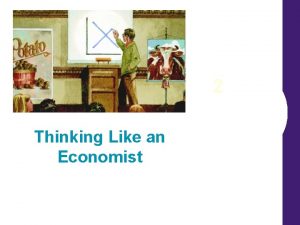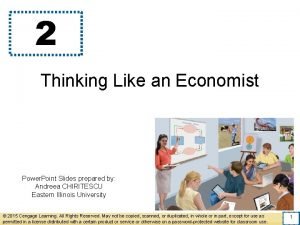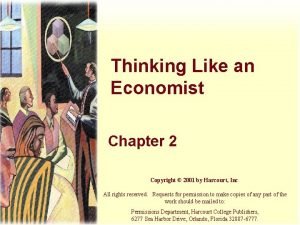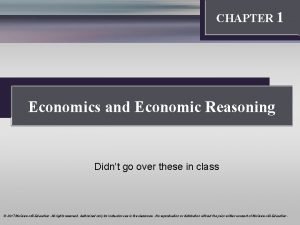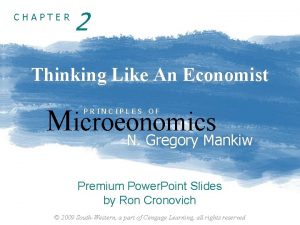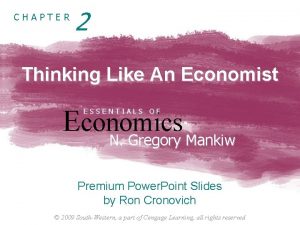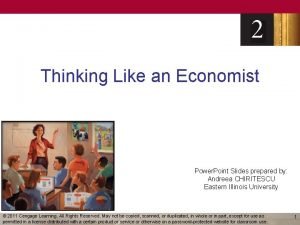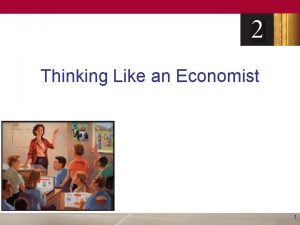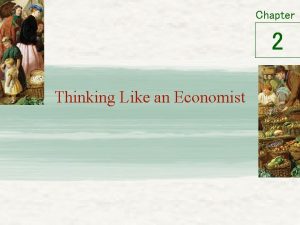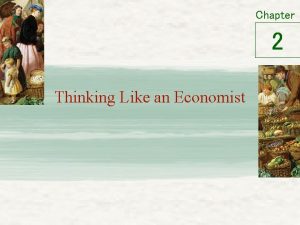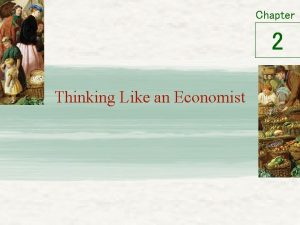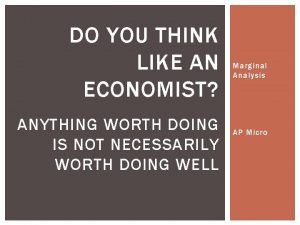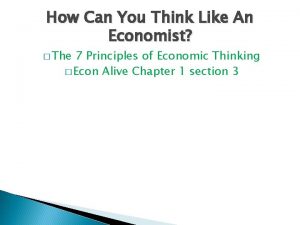DO YOU THINK LIKE AN ECONOMIST True or







- Slides: 7

DO YOU THINK LIKE AN ECONOMIST True or False

1. 2. 3. 4. 5. Because it is desirable, sunshine is scarce. Because it is limited, polio is scarce. Because water covers three-fourths of the earth’s surface and is renewable, it cannot be considered scarce. The main cost of going to college is tuition, room and board. If mass transportation fares are raised, almost everyone will take the trains anyway.

6. 7. 8. 9. 10. You get what you pay for. If someone makes an economic gain, someone else loses. If one nation produces everything better than another nation, there is no economic reason for these two nations to trade. A non-regulated monopoly tends to charge the highest possible price. A business owner’s decision to show more care for consumers is a decision to accept lower levels of profits.

Questions 1 -4 are about scarcity. Goods are scarce because we have limited resources and unlimited wants. We can’t have everything we want. Whenever people make a choice, they sacrifice something else (called opportunity cost). To be scarce, something mist be limited and desirable. Scarce goods have prices. 1. 2. 3. 4. Sunshine isn’t scarce because it isn’t limited; it is a free good. Polio isn’t scarce because it isn’t desirable. Scarcity is a relative, not an absolute, concept. Because resources are scarce and wants are unlimited, almost everything is scarce. If you pay an opportunity cost to use a good or service, it is scarce. If you pay a positive price for a good or service, it is scarce. Water may cover three-fourths of the earth, but we pay an opportunity cost and a positive price for clean water everywhere. Water may be scarcer in the desert than in the wetlands. Only a government can actually make water cheaper in a desert. An important opportunity cost of going to college is lost earnings. If you could earn $20, 000 a year by working, you will sacrifice $80, 000 during four years of college.

Questions 5 and 6 concern the laws of supply and demand. People tend to buy more of something when the price is lower and less when the price is higher. This price includes money as well as such things as time, aggravation, inconvenience and moral guilt. Sellers will try to sell more of something if the price is higher and less of it if the price is lower. This conflict is resolved through the market. If all other things are equal, less mass transportation will be purchased if the price is higher. The price could be increased in terms of dollars, inconvenient schedules, crime and filthy cars. The demand curve for transportation would have to be perfectly inelastic, or vertical, for the answer to this question to be True. 6. The price of something depends on supply and demand, not on usefulness or on some criterion of quality. Water is more useful than diamonds, but it has a lower price. What you pay for a good or service depends on the market price determined by supply and demand. 5.

Questions 7 and 8 concern gains from trade. 7. and 8. When people trade voluntarily, both parties expect to gain, or they wouldn’t trade. One reason for this gain is the law of comparative advantage. If one person does legal work better than another and if a second person wordprocesses documents better than the first, they would gain by trade. But would a lawyer who is the fastest word processor in town hire a secretary? Yes, because of comparative advantage: Each person would specialize in what he or she does comparatively better. An hour spent word processing is an hour not spent in legal work, and the opportunity cost for the lawyer would be very high. The lawyer will specialize in legal work and the secretary in word processing. The total output of goods and services will increase. This concept can also be applied to countries.

Questions 9 and 10 concern businesses and the role of profits. A monopoly charges a higher price than a competitive market price, but the monopolist cannot repeal the law of demand. If the price is too high, the monopolist might sell nothing. A monopolist will try to establish a price at a point that will make the greatest profit. This price is higher than a competitive price and will result in less production. 10. Profits are incentive for business to succeed. A business that doesn’t care about its customers will not make high profits. As Adam Smith said, “It is not from the benevolence (a gift given out of generosity) of the butcher, the brewer or the baker that we expect our dinner, but from their regard for their own interest. We address ourselves not to their humanity but to their self-love, and never talk to them of our own necessities but of their advantages. ” 9.

